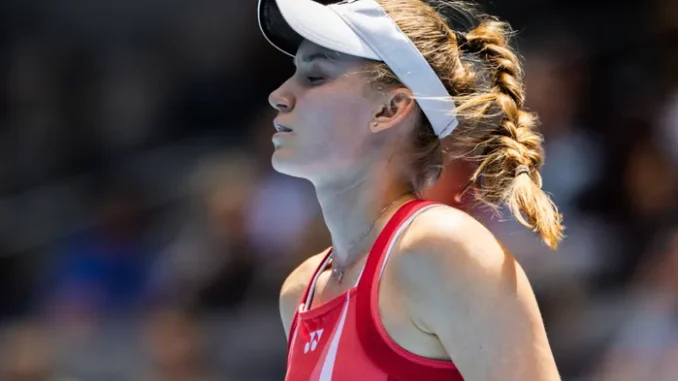
Badosa’s Heartbreak in Stuttgart: A Story of Missed Opportunities and Rybakina’s Resilience
The Porsche Tennis Grand Prix in Stuttgart witnessed a dramatic encounter between Paula Badosa and Elena Rybakina, a match filled with exhilarating moments, nail-biting tension, and ultimately, a heartbreaking defeat for Badosa. The Spaniard, seemingly on the cusp of victory, squandered six match points, allowing Rybakina to mount a remarkable comeback and snatch the win. The match served as a stark reminder of the fine margins that define professional tennis, and the mental fortitude required to capitalize on opportunities.
Badosa’s performance throughout much of the match showcased her talent and determination. She played with aggression and precision, dictating the tempo and putting Rybakina under immense pressure. Her shot-making was impressive, her movement around the court fluid and purposeful. She appeared to be in control, seemingly cruising towards a well-deserved victory.
“I felt like I was playing some of my best tennis,” Badosa reflected after the match, highlighting the quality of her play for a significant portion of the encounter. This self-assessment underscores the disappointment of the eventual outcome, as she recognized the high level she achieved, only to see it slip away.
As the match progressed, Badosa found herself in a commanding position, holding six match points. For most players, even one match point would be a cause for celebration, a moment to seize and secure the win. But in the unforgiving world of professional tennis, nothing is guaranteed until the final point is played. Badosa, despite her strong performance, couldn’t convert any of those six opportunities.
The inability to close out the match despite having so many chances undoubtedly took a toll on Badosa. The pressure mounted with each missed opportunity, and the momentum began to shift. Rybakina, sensing her opponent’s vulnerability, seized the moment, raising her game and capitalizing on Badosa’s faltering confidence.
“It’s tough to lose a match like that,” Badosa admitted, acknowledging the emotional impact of the defeat. The disappointment was palpable, as she had come so close to victory, only to see it snatched away at the last moment.
Rybakina’s comeback was a testament to her resilience and her mental strength. She refused to succumb to the pressure, even when facing multiple match points. She maintained her focus, played with composure, and waited for her opportunity. Her ability to turn the match around was a demonstration of her competitive spirit and her unwavering belief in herself.
“I just tried to stay focused and fight for every point,” Rybakina explained, highlighting her mental approach to the match. This simple statement underscores the importance of mental fortitude in tennis, especially in crucial moments. Rybakina’s ability to remain composed under pressure proved to be the difference between victory and defeat.
The match served as a stark reminder of the fine margins that define professional tennis. Even the smallest lapse in concentration or a slight dip in form can be costly. In a sport where the difference between winning and losing can come down to a single point, mental toughness and the ability to handle pressure are essential.
Badosa’s experience in Stuttgart will undoubtedly be a learning experience. While the defeat was painful, it provides an opportunity for growth and improvement. She will analyze the match, identify areas where she can improve, and use this experience to strengthen her mental game.
“I will learn from this and come back stronger,” Badosa affirmed, demonstrating her commitment to improvement. This positive attitude is crucial for any athlete who wants to succeed at the highest level. The ability to learn from setbacks and use them as motivation is a hallmark of a true champion.
The match between Badosa and Rybakina was a microcosm of the drama and excitement that makes professional tennis so captivating. It showcased the highs and lows of the sport, the thrill of victory and the agony of defeat. It was a reminder that even the best players can have off days, and that resilience and mental strength are just as important as skill and talent.
Badosa’s experience in Stuttgart, while disappointing, will undoubtedly make her a stronger player in the long run. She will learn from this setback, refine her game, and come back more determined than ever. The tennis world eagerly awaits her return to the court, confident that she will bounce back from this experience and continue to showcase her talent and competitive spirit. The story of Badosa’s near-victory and Rybakina’s resilient comeback will serve as a reminder of the unpredictable nature of sport and the importance of mental fortitude in the face of adversity. It’s a narrative that underscores the fine line between triumph and heartbreak, and the crucial role that mental strength plays in determining the outcome of even the most closely contested matches.
Leave a Reply